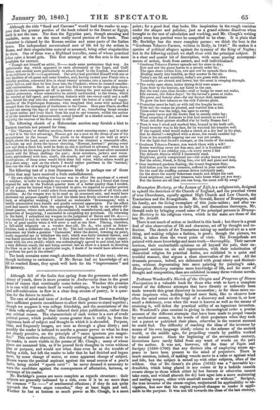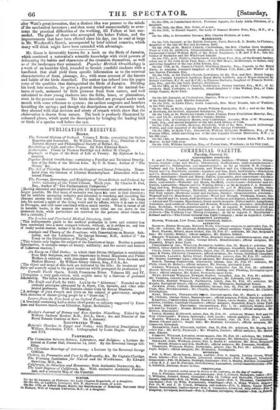Professor Woodcroft's Sketch of the Origin and Progress of Steam.
Navigation is a valuable book for those who wish to have a complete record of the different attempts that have directly or indirectly been made towards this great discovery in locomotion ; or for those more ca- rious inquirers who, looking beyond mere facts, like to observe how often the mind seems on the verge of a discovery and misses it, or how small a deficiency, even when the want is known as well as the means of attaining it, will defeat the practical utility of an ingenious invention. Mr. Woodcroft's plan consists in giving in chronological order a precise account of the different attempts that have been made to propel vessels by mechanical means, in the words of their projectors when they took out a patent or published their plans, otherwise in the nearest account he could find. The difficulty of reaching the ideas of the inventor by means of his own language chiefly relates to the scheme of the ancient world, or the middle ages, for propelling vessels by paddles worked by animal power. Since the beginning of the seventeenth century, inventions have rarely failed from any want of words on the part of the author. It was not, however, till the time of Pepin and Savigny (1680-1700) that any distinct idea of employing steam ap- pears to have been present to the mind of projectors. There. 113 much mention, indeed, of making vessels move in a calm or against wind and tide, but the subject is mixed up with other subjects, often of the wildest. One of Dr. Greait's six plans (1632) was a "moveable hy- draulicks, which being placed in any roome or by a bedside causeth sweete sleepe to those which either by hot feavers or otherwise cannot take reste, and withal altereth the dry hott ague into a more moistening and cooling temper, either with musical! sounds or without." Savigny, the true inventor of the steam-engine, conjectured its applicability to na- vigation, but saw that his engine required changes to render it appli- cable to the purpose. It was not till towards the close of the last century, after Watt's great invention, that a distinct idea was present to the minds of the mechanical inventors ; and then many tried unsuccessfully to over- come the practical difficulties of the working, till Fulton at last suc- oeeded. The plans of those who attempted this before Fulton, and the improvements that have been effected since his day, can be read at large in Bit.. Woodcroft's Sketch, accompanied by brief critical remarks, which many will think might have been extended with advantage.



























 Previous page
Previous page